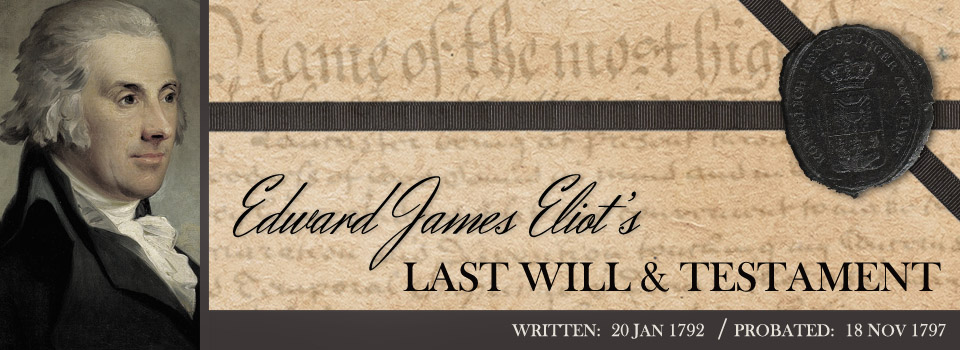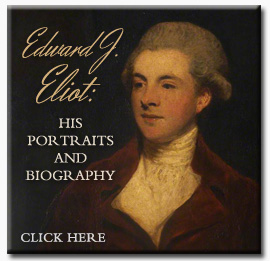Last Will and Testament of Will of Edward James Eliot
(A transcription of E.J. Eliot's first will is also included at the bottom of this page.)
This is the last will and testament of me, the Honourable Edward James Eliot, one of the Commissioners of his Majesty's Treasury.
Whereas, by the settlement unto and executed by my father, Lord Eliot, and myself, and bearing date the twenty eighth day of Anno now last past, I am empowered to charge the Craggs Estate with the sum of ten thousand pounds, to be paid to such person and persons, and for such interests and purposes, as I shall, by my last will and testament in writing, to be executed in the presence of and to be attested by two or more credible witnesses, direct or appoint, in pursuance and execution therefore, of their said power. I do hereby direct that the Trustees of the term of one thousand years, created by the said settlement, to raise the said sum of ten thousand pounds as soon as conveniently may be after the death of my father, Lord Eliot, and to pay the same, together with the interest thereon from the death of my father, to my Dear Darling Daughter Harriot Hester Eliot, upon her attaining the age of twenty one years, or upon her marriage under the age of twenty one years with the consent of my brothers in law, the Earl of Chatham and the Right Honourable William Pitt, and of my esteemed friend, George Lord Bishop of Lincoln, or of any two of them, which shall first happen; but, in case my said Daughter shall marry under that age without such consent as aforesaid, then I will and direct that the said sum of ten thousand pounds shall be settled upon such her marriage, for the benefit of herself and the children of such marriage, in such manner as the said Earl of Chatham, Mr. Pitt and the Bishop of Lincoln, or any two of them, shall see fit.
And whereas, by the same settlement, I am empowered by my will to name such persons whose consent shall be required to the holy marriage of my daughter and to consequent settlement or conveyance of the Craggs Estate and payment or settlement of the portion thereby provided for her. I do, therefore, in execution of the said power, hereby will and direct that the consent of the said Earl of Chatham, Mr. Pitt and the Bishop of Lincoln, or of any two of them, shall be necessary for the purpose last mentioned. I do hereby give and devise my burgage tenements in the Borough of Saint Germains to the use of such person and persons, and for such estates and interests, and subject to the same power as the Borough of Saint Germains and the several burgages, messuages, tenements and hereditaments in the same Borough, and by the before mentioned settlement, limited and settled.
And all the rest and residue of my personal estate, I give and bequeath to my said Daughter, Harriot Hester Eliot, her executors, administrators and assigns. And I do hereby nominate, constitute and appoint my most respected Mother in Law, the Dowager Countess of Chatham; and the said John, Earl of Chatham; William Pitt and George, Lord Bishop of Lincoln, to be Guardians of my daughter during her minority. And I constitute and appoint the said John, Earl of Chatham, William Pitt and George, Lord Bishop of Lincoln executors of this my will.
In witness, whereof, I leave to this my last will and testament, contained in one sheet of paper. Subscribed and set my hand and seal this twentieth day of January in the year of our Lord one thousand seven hundred and ninety two.
Ed:J: Eliot (seal)
Signed, sealed, published and declared by Edward James Eliot, the testator, as and for his last will and testament, in the presence of us who, at his request, in his presence, and in the presence of each other, have subscribed our names as witnesses hereto:
James Cocks
James Window
William Hare
PROBATE
This will was proved at London, the eighteenth day of November in the year of our Lord one thousand seven hundred and ninety seven, before the Worshipful Sir William Scott, Knight, Doctor of Law, surrogate of the Right Honourable Sir William Wynne, Knight, also Doctor of Law, Master Keeper or Commissary of the Prerogative Court of Canterbury, lawfully constituted by the oaths of the Right Honourable John, Earl of Chatham; the Right Honourable William Pitt; and the Right Reverend father in God, George, by Divine permission, Lord Bishop of Lincoln, the executors named in the said will, to whom administration of all and singular the goods, chattels, and credits of the deceased was granted, having been first sworn duly to administrator and executor.

(The following is a transcription of Edward James Eliot's first will. It was a short document, written in his own handwriting on 25 of March 1787 at Downing Street, Westminster, and addressed "to The Rt. H. William Pitt & H. John Eliot".)
Written on this twenty-fifth of March, soon after twelve o'clock, and six calendar months after I had seen my last of almost all I hold dear in the world – my beloved Harriot – but in earnest and anxious expectation of a future and happy meeting. My will and desire is to leave everything I [am] possessed of to her and my only child. Desiring, however, that all that can – with advantage – be turned into money, it should be so, and laid out in the public funds, for her use. Desiring also that what little may arise from the interest of that of the money now in the funds and of that upon marriage, over and above the necessary expence of her education, may also be again laid out from time to time in the public funds, up to the time of her attaining the age of twenty one, or of marrying with the consent of her Uncle the Right Honorable William Pitt, whom – together with the Honorable John Eliot – I request to see the provisions of this paper executed. And to whom (R:H: William Pitt) I leave, in token of his kindness and generosity to me, all the property of every kind which I have hereby secured to my dearest daughter, in case of her death before the time of her coming of age or of marrying with his consent. And I moreover desire [that] he may have the sole and exclusive right of directing the place and manner of her education, as far as he pleases to exert it.
Ed. J. Eliot

